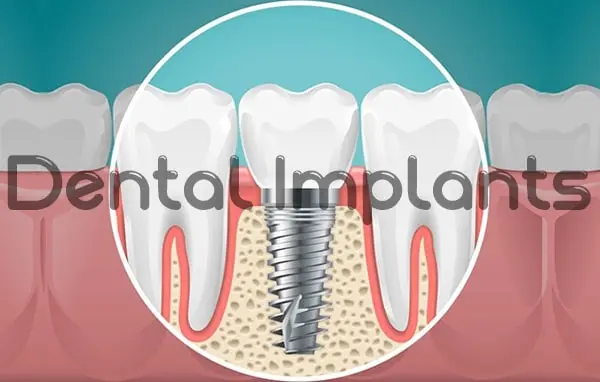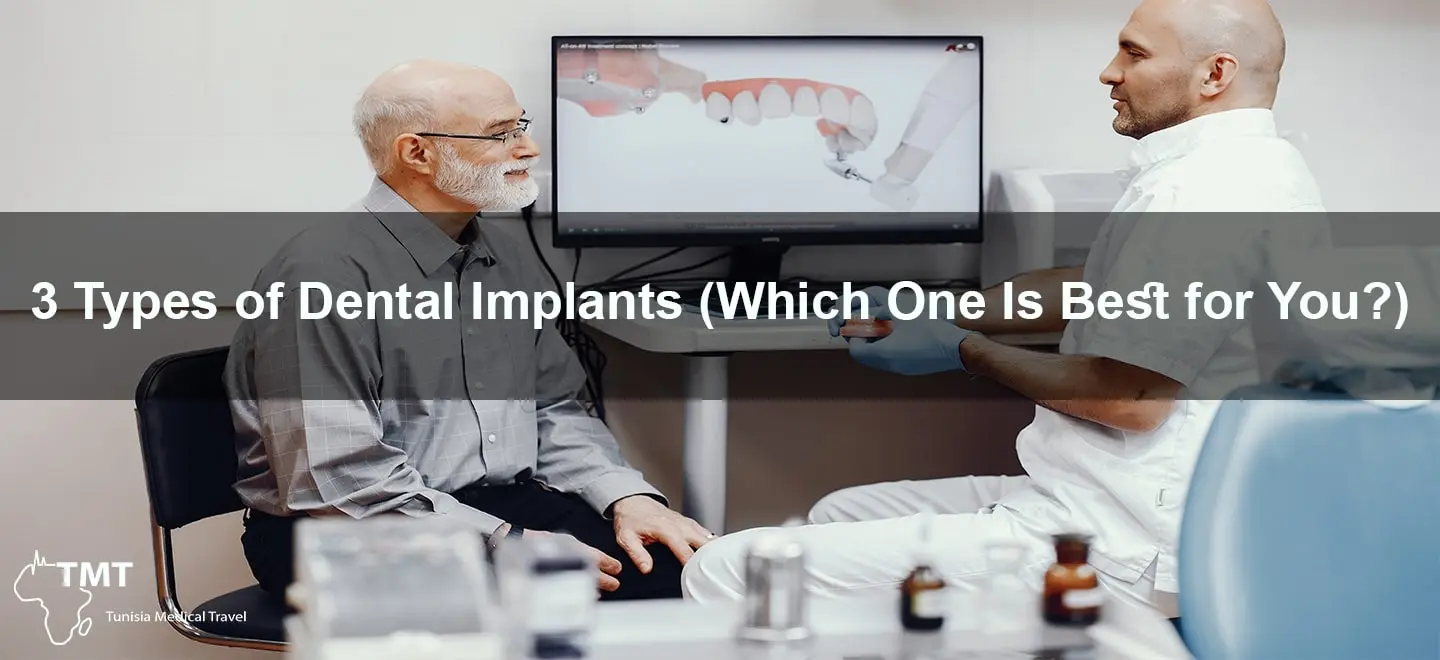3 Types of Dental Implants (Which One Is Best for You?)
3 Types of Dental Implants (Which One Is Best for You?)
What is a Dental Implant?
A dental implant is a small, screw-like post made from biocompatible materials, such as titanium, which is surgically placed into the jawbone. This post serves as an artificial root for a replacement tooth or teeth. Over time, the implant integrates with the jawbone, providing a stable and secure foundation for the new tooth. This process, known as dental implantation, offers a durable and natural-looking solution for missing teeth.
A dental implant consists of three parts: the implant itself, which fuses with the jawbone; the abutment, which connects the implant to the replacement tooth; and the crown, which is the visible part of the tooth. Dental implants can replace a single tooth, several teeth, or even all of your teeth, making them a versatile option in implantation dentistry.
3 Different Types of Dental Implants
When it comes to dental implants, there are three primary types to consider, each suited for different needs and situations.
1) Replacing a Single Tooth: Use a Single Dental Implant
If you’re missing just one tooth, a single dental implant is the ideal solution. This involves placing one implant in the jawbone, onto which a single crown is attached. This method mimics the function and appearance of a natural tooth, ensuring that your smile remains intact and functional.
A single dental implant is beneficial because it doesn’t affect the adjacent teeth. Unlike a dental bridge, which requires grinding down the neighboring teeth, a single implant stands independently. This approach preserves the integrity of your natural teeth and provides a permanent solution for a missing tooth.
2) Replacing Several Teeth: Use an Implant-Supported Bridge
For those missing multiple teeth in a row, an implant-supported bridge is an excellent option. Instead of placing an implant for each missing tooth, two implants are inserted at either end of the gap, and a bridge (a row of artificial teeth) is anchored onto these implants. This provides a stable and cost-effective solution for restoring multiple teeth.
An implant-supported bridge offers several advantages over traditional bridges and dentures. It is more stable and comfortable, reducing the risk of shifting or slipping. Additionally, it helps maintain the jawbone’s integrity, preventing bone loss that often occurs with missing teeth. This method ensures a durable and long-lasting replacement for several missing teeth.
3) Replacing All Your Teeth: Use an Implant-Retained Denture
In cases where all teeth are missing or need to be replaced, an implant-retained denture offers a full-mouth restoration. This involves placing several implants in the jawbone, onto which a full set of dentures is securely attached. This method provides better stability and comfort compared to traditional dentures, enhancing your ability to chew and speak naturally.
An implant-retained denture is a game-changer for those who have lost all their teeth. It offers superior support and prevents the dentures from slipping or causing sores. The implants stimulate the jawbone, preventing the bone loss that typically occurs with conventional dentures. This type of restoration improves not only your oral health but also your quality of life.
What’s the Dental Implants Process?
The process of getting dental implants typically involves several steps. During the initial consultation and planning phase, your dentist will assess your oral health to determine if you are a suitable candidate for dental implantation, which includes taking X-rays and impressions of your teeth and jaw. In the next step, the implant is surgically placed into the jawbone under local anesthesia, usually taking about an hour per implant. This placement requires precision and expertise. After the implant is placed, a healing period of several months is necessary for osseointegration, where the implant integrates with the jawbone to ensure its stability. Once osseointegration is complete, an abutment, or connector piece, is attached to the implant, serving as the base for the new tooth. Finally, a custom-made crown, designed to match the color and shape of your natural teeth, is placed onto the abutment, completing the restoration process and providing a seamless and natural-looking result.
What is a Dental Bridge?
A dental bridge is a fixed dental restoration used to replace one or more missing teeth by joining an artificial tooth definitively to adjacent teeth or dental implants. Traditional bridges are supported by natural teeth, but implant-supported bridges are anchored to dental implants for added stability and durability. This option is especially beneficial for those seeking a long-term solution for missing teeth without the drawbacks of removable dentures.
The concept of what is a tooth implant plays a crucial role in understanding how dental bridges function. While traditional bridges rely on natural teeth for support, an implant-supported bridge uses dental implants as secure anchors, offering enhanced strength and longevity. This method ensures a more stable and natural-looking replacement for missing teeth.

What is an Implant-Retained Denture?
An implant-retained denture is a type of overdenture that is supported by and attached to implants. Unlike traditional dentures, which can slip and cause discomfort, implant-retained dentures offer a more secure and comfortable fit. This option is ideal for those who have lost all their teeth but want a more stable and natural-feeling solution than conventional dentures.
The term false teeth implants is often used to describe these dentures, highlighting their role as a more permanent and reliable alternative to traditional dentures. Implant-retained dentures provide the stability needed for daily activities, such as eating and speaking, without the worry of dentures slipping out of place. This innovation in implantation dentistry significantly improves the quality of life for individuals with complete tooth loss.
Am I a Good Candidate for Dental Implants?
Not everyone is a candidate for dental implants. Good candidates typically exhibit several key characteristics. Firstly, they must have adequate bone density, as sufficient bone in the jaw is necessary to support the implant. If there is not enough bone, a bone graft may be required. Understanding what a dental implant involves includes recognizing the importance of bone density for the success of the procedure. Secondly, good oral health is essential. Healthy gums and teeth are necessary to prevent infection and ensure successful integration of the implant, and conditions such as gum disease need to be treated prior to the implantation process. Additionally, non-smoker status is important because smoking can impair healing and increase the risk of implant failure. Maintaining a healthy lifestyle is crucial for the best possible outcome of dental implants. Lastly, overall health plays a significant role; conditions like diabetes or immune disorders can affect the healing process and the success of the implantation. Therefore, a thorough medical evaluation is necessary to determine one’s suitability for dental implantation.
Questions About the Types of Dental Implants?
If you have any questions about implants, including the types and which one might be best for you, it’s essential to consult with a dental professional. They can provide personalized advice based on your specific needs and oral health condition.
you need to replace a single tooth, several teeth, or all your teeth, there’s an implant solution that can meet your needs. Understanding the different types and the process involved will help you make an informed decision about your dental health. Implants offer a permanent, reliable, and aesthetically pleasing solution for tooth loss, ensuring you can smile with confidence once again.
The world of dental implantation provides various options to cater to individual needs. Whether it’s a single tooth implant, an implant-supported bridge, or an implant-retained denture, the advancements in implantation dentistry have made it possible to restore smiles with precision and care. With proper consultation and planning, you can find the right implants to enhance your oral health and overall well-being.

